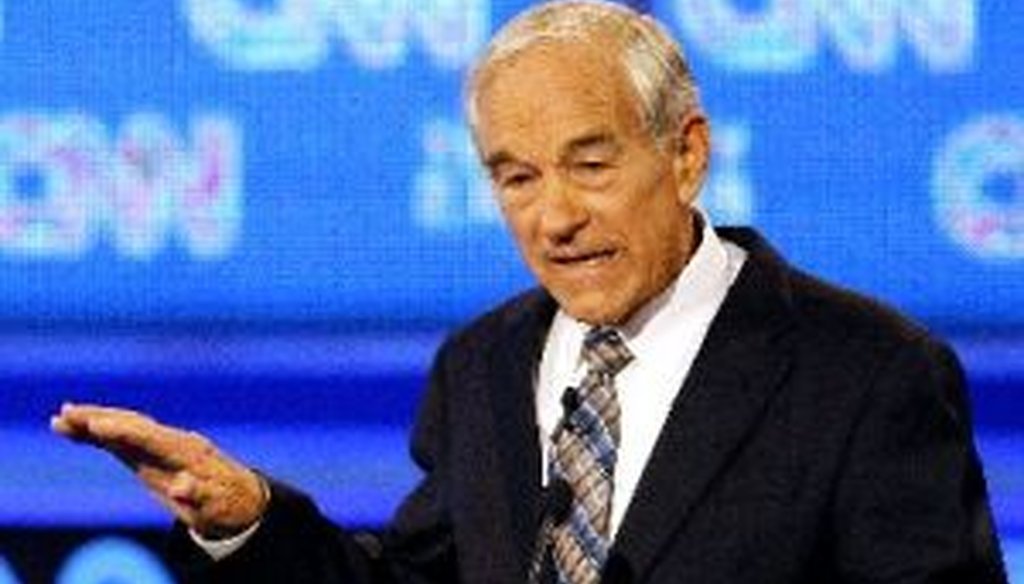Stand up for the facts!
Our only agenda is to publish the truth so you can be an informed participant in democracy.
We need your help.
I would like to contribute

Republican presidential candidate Rep. Ron Paul, R-Texas, gestures during a Republican presidential debate on Sept. 12, 2011, in Tampa.
Ron Paul says under Rick Perry, government jobs grew by 170,000 in Texas
With the polls now showing Rick Perry ahead for the Republican nomination, his opponents are trying to undercut his claims of soaring job growth while he's been governor of Texas.
During the Sept. 12, 2011, Republican presidential debate in Tampa, Rep. Ron Paul, R-Texas, sought to put some blemishes on Perry’s record by noting that many of the new jobs were in the government.
CNN anchor Wolf Blitzer, the debate moderator, began the exchange by asking Paul about Perry’s claims of economic success in the Lone Star State. "You’re from Texas," Blitzer said. "Does your governor deserve all that credit?"
Paul answered, "Not quite. I’m a taxpayer there. My taxes have gone up. Our taxes have doubled since he’s been in office. Our spending has gone up double. Our debt has gone up nearly triple. So, no. And 170,000 of the jobs were government jobs. So I would put a little damper on this, but I don’t want to offend the governor, because he might raise my taxes or something."
For this item, we’re looking exclusively at Paul’s claim that "170,000 of the jobs" created in Texas under Perry "were government jobs."
We turned to the Bureau of Labor Statistics, the official federal source of employment data for the nation, states and localities. We looked at government job growth during Perry’s tenure, from January 2001 to July 2011:
State government jobs: Increase of 49,100, or about 4,600 per year of Perry’s tenure
Local government jobs: Increase of 217,600, or about 20,700 per year
Federal government jobs: Increase of 19,700, or about 1,900 per year
Total government jobs: Increase of 286,400, or about 27,300 per year
Meanwhile, Texas employment overall increased over this period by 1,078,600, or about 102,700 per year.
Looking at it a different way, the number of local government jobs has increased by 21 percent during Perry’s tenure, while state government jobs have expanded at a 15 percent clip.
Let's put all of this in perspective. The increase in state government jobs represented about 4 percent of Texas’ total jobs increase; for local government jobs, it was 20 percent; for federal jobs, it was less than 2 percent.
We see a few different ways to analyze these numbers.
First, in critiquing Perry, not all government jobs are created equal. Perry has the most direct influence over the growth in state jobs. His influence on local government jobs is weaker. And he has relatively little influence in securing federal job increases. (Indeed, given his theme that the feds are overreaching, he might very well want fewer federal employees.)
How big is Perry’s sway over local government jobs? We checked with representatives of cities and counties, and they agreed that it is pretty limited.
Cities get about 36 percent of their funds from property taxes, 29 percent from sales taxes and much of the rest from items such as fines, right-of-way rentals and user fees, said Bennett Sandlin, executive director of the Texas Municipal League, which represents 1,100 Texas cities. Those sorts of income streams are not affected by the governor to any significant degree.
Counties, similarly, are "highly reliant on the property tax," said Elna Christopher, a spokeswoman for the Texas Association of Counties. She said that state mandates can affect county employment numbers, particularly because a jail standards commission sets required ratios between prison inmates and correctional-officers. But while the governor appoints the commissioners, he doesn’t directly influence their deliberations.
This leaves one major area: the public schools. The state government does have significant influence over education budgets -- and most recently, this impact has been to shrink rather than increase. Earlier this year, Perry and the legislature decided to fund school districts by $4 billion less in 2012-13 than existing formulas would have provided.
Featured Fact-check
And during Perry’s tenure, local education jobs -- which Perry would have the most influence over -- have increased at a slower rate than local government jobs as a whole. Local education jobs have risen at about 11 percent, while non-educational local government jobs have risen by 37 percent.
So with the government jobs Perry can affect the most -- state jobs -- the raw-number increase was well below what Paul claimed. Only if you use a more expansive definition of government jobs -- including jobs Perry doesn’t have much of an impact on -- is the increase bigger than what Paul claimed.
Having said that, the increase in total government jobs under Perry is not trivial. State government jobs represented 4 percent of the overall increase for all types of jobs, but the combination of all government jobs accounted for nearly 27 percent. And if you look at government jobs as a percentage of all jobs in Texas, the share has risen from 16.4 percent at the start of Perry’s tenure to 17.5 percent today.
And here’s one more factor to consider: As state and local government jobs were increasing, so was the state's population -- more rapidly than anywhere in the nation.
Between mid 2001 and mid 2010, Texas’ population increased by a whopping 20 percent. The growth in local government jobs -- 21 percent -- roughly kept pace with that growth, while state government jobs increased at a somewhat slower pace, 15 percent.
Both growth rates were faster than the national average. Nationally, local and state government jobs both grew by slightly under 6 percent during the same period.
Our ruling
We can’t find an exact match for Paul’s 170,000 figure in the official statistics, and getting to that number requires not just state jobs, but also local government jobs that Perry would have had difficulty influencing.
Still, there's some truth in Paul’s underlying claim that a notable share of the job growth Perry touts on the campaign trail came from government jobs. Even leaving out federal jobs, about one out of every four new jobs in Texas during Perry’s tenure has been a new state or local government job. So while Paul is wrong on the specific numbers, he makes a larger point with some merit. We’ll call it Half True.
Our Sources
CQ Transcripts, "Republican presidential candidates participate in a CNN-Tea Party Express GOP Presidential Debate," Sept. 12, 2011 (subscribers only)
Bureau of Labor Statistics, one-screen search page for "Employment, Hours, and Earnings - National (Current Employment Statistics - CES)," accessed Sept. 13, 2011
U.S. Census Bureau, Interactive Population Map, accessed Sept. 13, 2011
U.S. Census Bureau, Annual Population Estimates 2000 to 2009, accessed Sept. 13, 2011
Associated Press, "Texas school cuts to be felt in ways big and small," Aug. 20, 2011
Interview with Elna Christopher, spokeswoman for the Texas Association of Counties, Sept. 14, 2011
Interview with Bennett Sandlin, executive director of the Texas Municipal League, Sept. 14, 2011
E-mail interview with Jesse Benton, spokesman for Rep. Ron Paul, Sept. 13, 2011
Browse the Truth-O-Meter
More by Louis Jacobson
Ron Paul says under Rick Perry, government jobs grew by 170,000 in Texas
Support independent fact-checking.
Become a member!
In a world of wild talk and fake news, help us stand up for the facts.














































